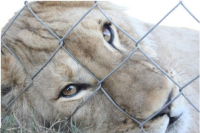News
Latest Lion Aid News
EU import ban for all wild lion trophies from South Africa.
Friday 13th January 2012
 LionAid recently revealed the great discrepancy between “wild” lion sport hunting trophies exported yearly from South Africa (an average of 265 per year over 2000-2009 according to CITES records) and the very small number of truly “wild” lions available (perhaps 15 per year from hunting concessions bordering on Kruger National Park for example). LionAid is delighted to be able to report that the Scientific Review Group (SRG) of the EC Wildlife Trade Regulations has considered the issue, and recently formed a “negative opinion” on all wild lion specimens originating from South Africa. This means there is an import ban in place as of 10th November 2011 into the European Union for all lion trophies from South Africa designated as “wild”. The Scientific Review Group judged that “wild” lion trophies (and all other lion products designated by CITES export permits as coming from a “wild” source) were being mislabelled. In other words, the SRG formed the same opinion as LionAid – there was either a “leakage” of captive bred lions into the “wild” category, and/or that such “wild” lion trophies might have originated from neighbouring countries (Zimbabwe, Mozambique) and declared in South Africa. Such mislabelling had been going on for many years, and we commend the SRG for this decision. It will not prevent “captive bred” trophies from being imported into the EU, but stands as a clear message to the exporting authorities and hunting operators in South Africa that mislabelling will no longer be tolerated by the European Union. We have also been assured in a meeting with the EU Directorate General for the Environment on January 11th that they will place all African lion imports into the EU on SRG agendas this year, with special emphasis on western and central African lion populations. The decision by the SRG on South African wild lions indicates once again the value of careful consideration of scientific data to guide informed opinions and policies. The SRG can revise the negative opinion in the future, but in the mean time a clear message has been sent to South Africa – amend your reporting to end mislabelling and fraudulent declarations, or suffer an import ban to the European Union. We would strongly advise the USA Management Authority (the US Fish and Wildlife Service) to take note of the SRG decision and follow suit. After all, close to 70% of “wild” South African lion trophies are imported into the USA… |
Posted by Pieter Kat at 15:15
No comments have been posted yet.
Add a new comment
Existing user
New user sign up



